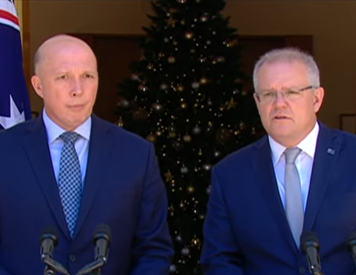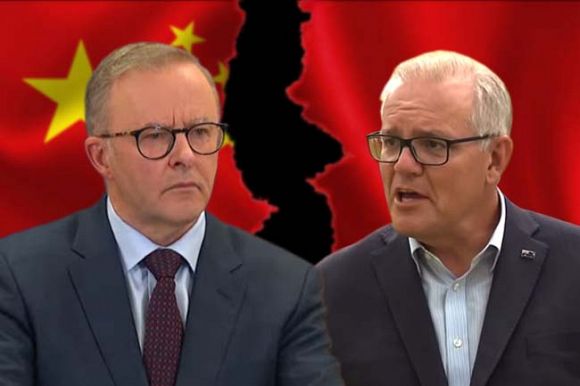The Chinese Government should consider the potential benefits of federal government in order to ease tensions and achieve economic prosperity, writes Dr Klaas Woldring.
CONSIDERING THE RECENT ABC Four Corners program on Australian preparations for a major war with China, as an ally of the United States, viewers must have been alarmed by the apparently advanced stage of preparations.
The re-election of Chinese leader Xi Jinping, after the controversial visit to Taiwan by U.S. House leader Nancy Pelosi, appears to have escalated the potential for a major war significantly. The massive display of Chinese military capacity that followed Mrs Pelosi’s visit no doubt also generated war talk and preparation. The major centre of activity appears to be the Northern Territory where B-52 bombers will be stationed.
However, surely such a war would be a dreadful mistake. What was missing altogether was that Australia could perhaps play a role as a peacemaker in this developing conflict, rather than a willing and active participant preparing for war. This option was not discussed at all. Recent statements made by the re-elected Chinese President emphasise the desire for a One China philosophy and also a preparedness to use demonstrated military power. The question surely is what kind of One China is acceptable to regions that are unwilling to accept being part of an authoritarian One China as presented by the current leader?
The potential for major conflict between China and the U.S. has recently been discussed by the Australian media at some length. As a migrant from the Netherlands, who experienced WWII and its aftermath in that country, the avoidance of war in favour of negotiation has shaped my thinking. Having lived twice in Southern Africa, first in Apartheid South Africa and Northern Rhodesia (1959-1964) and, later, as an academic in independent Zambia (1979-1981), conflict resolution has long fascinated me.
I gained my PhD somewhat later in life than most, in 1974, based essentially on the politics of and opposition to Apartheid as a system of government. In this process, I came across serious studies about and examples of federations. However, a new decentralised unitary Constitution was achieved there in 1996, more than 20 years after I completed my PhD.
While the (colonial) Federation in Australia was a very sensible structure in 1901, possibly up to 1945, it no longer serves Australia well. If Australia is to become a republic, it should revise its Constitution drastically and, conceivably, at the same time abandon federation. I co-wrote and edited a book about this in 2015 with several other authors (Beyond Federation). The essence of federation is that it must suit the circumstances of a given set of political forces and ambitions of a number of territories. A common and divided sovereignty connects the polity as one unit. This potential does exist in China.
The situation there presents several regional conflict situations, but the central Government insists on total dominance while a federal structure would, in my view, provide scope for including diversity and achieve much better outcomes as a result. In addition, international tension would also be avoided. Although I am not a China politics specialist at all, the recent dramas over Taiwan and Hong Kong have been discussed in the Australian media at considerable length. I became interested and started reading.
There has been much talk earlier by the Chinese Government about “two systems”, especially in relation to Hong Kong. However, just exactly what that means remained unclear. It has been forcibly abandoned in Hong Kong, by Xi Jinping, at considerable cost and strife. Reading literature about the 20th-century history of federal attempts in China to integrate “two systems” within a federal structure is instructive. They appear to have failed prior to Mao Zedong.
However, federation is in fact not quite the same as “two systems”. In a federation, there is a national government for all the participants, therefore a common system, but there is also the division of sovereignty internally between participating regions, all enshrined in the national Constitution. So that makes One China very possible, as a federation, but with different policy sub-systems and values that can co-exist in the participating regional states.
I was impressed with and inspired by comments of the Chinese Ambassador in Australia, Xiao Qian, reported in a recent Saturday Paper as follows:
‘“The Taiwanese are compatriots of China and the least thing we are ready to do is to use force”, Xiao said. “And that is one of the reasons why China has been so patient for several decades. We are waiting. We are waiting for peaceful unification. But we cannot rule out the option to use other means”.’
However, in relation to Taiwan, China is not just waiting. It is also displaying great displeasure and demonstrating enormous military dominance, while talking about the need for “re-education”, after unification. It is not offering the acceptability of alternative ideology. This can only alienate not only the Taiwanese but also the international world. Why should the Taiwanese want to join a clearly authoritarian One China? A federal structure guaranteeing the continuation of political, economic and social life in regions of the country would make much more sense.
Similarly, the imposition of One China on Hong Kong, as insisted on by the current Chinese Government, has been a staunchly rejected operation as well instead of bringing together joint interests and regional differences. Why not go federal, release all these people in gaol there and get them back to a semi-autonomous federal Hong Kong within One China? In other words, why not recreate the meaning and philosophy of One China in the context of a federal structure?
I understand that even the young Mao Zedong actually favoured the idea of a federal China, splitting the whole of China into 27 countries (also even earlier in the 1920s apparently, according to one source, federalism was actively discussed). More recently, federal proposals have also been made. I read about Charter 08 co-written by Nobel Peace Prize winner Liu Xiaobo. The general tenor of this proposal is democratic and, like what I am arguing here, recommends that China should incorporate the freedoms that exist in the bordering regions where strong opposition exists to forced incorporation into an authoritarian One China model. It is hard to believe that there is so much opposition to that by the present leadership under Xi Jinping. This is clearly even counter-productive to the ideal of “One China”.
In a recent Australian Financial Review article, the Chinese Ambassador to Australia was quoted as saying that the One China principle would “maintain regional peace and stability”. But this is not what is happening. There are several other regional issues apart from Taiwan and Hong Kong where the current dominance of the Chinese Government is exactly what is rejected — and rejected very strongly. It is not peace that is achieved at all. On the contrary, there are other regions that would probably welcome a federal structure, notably Tibet, Macao, Inner Mongolia and Xinjiang, according to another source.
Perhaps the most internationally disturbing region now is Northwestern Xinjiang, home of the Muslim Uighurs. Many of these want complete independence from China, although they are not the biggest Muslim population in China (the Hui are — a 10.5 million-strong group that is also the second largest of China’s 55 officially recognised ethnic minorities). The stories of discrimination against the Uighurs, in the Western media at least, are certainly disturbing. One wonders if a federal solution here would be a better outcome than apparently unwanted Chinese re-education and discriminatory treatment.
Australia’s positive relationship with China has suffered considerably in the recent Scott Morrison Government period with the former PM and his cabinet teaming up with the U.S. and causing tensions that are not in the interest of both China and Australia. It is instructive to read articles by former senior politicians Kevin Rudd and John Hewson in recent issues of the Saturday Paper stressing the importance of restoring sound diplomatic and commercial relations between Australia and China.
The possibility of Kevin Rudd becoming Australia's next ambassador to the U.S. is to be welcomed. Rudd is well-informed on Chinese politics and speaks Mandarin. His status as a former Australian PM in China and the U.S. is especially significant in this context. The attitudes of the new Albanese Federal Government are a lot more realistic than that of several previous conservative Australian governments overly stressing the importance of the alliance between the U.S. and Australia, forged during WWII.
In any case, the chances of a major conflict between China and the U.S. are not all that obvious if one considers the enormous involvement of the Chinese Government in the economy of the U.S. in the last 20 years or so. Similarly, the involvement by U.S. corporations in the Republic of China in the same period has grown steadily and is equally substantial. The prospect of war between these two superpowers does not make sense and the Taiwan visit of Mrs Pelosi therefore may not be all that significant in the longer term.
What it did bring to light is that there is actually quite a lot of contact between Taiwan and the mainland in terms of trade and people working and visiting. Surely, the attitudes and political values of the Chiang Kai-shek period are now well and truly part of a history that is behind us.
My conclusion is that the current Chinese Government should re-visit the potential values of federal government and apply them to current realities and tensions. There are of course many other issues facing the Chinese Government. The assistance extended to a large number of African countries which, I recall, started with the politically then very important construction of the Tanzam Railway, is mostly seen by Western powers more as a growing world power display. The more recent extension of support/aid to Pacific countries is similarly viewed by critics as a new dimension of that and has also concerned Australians. In addition, the Chinese economy itself appears to be in considerable difficulty.
One might seriously wonder now if engaging in war would be a sensible choice for China and the countries that do business with them.
Dr Klaas Woldring is a former Associate Professor at Southern Cross University. He is a committee member of ABC Friends, Central Coast.
Related Articles
- China and Iran protestors fighting for real democracy, not capitalist capture
- Need for alternate foreign policy as U.S-Australia alliance questioned
- Solomon Islands agreement puts Australia in crosshairs of U.S. and China
- Hysteria over the Solomon Islands-China security pact
- Morrison's arrogance toward South Pacific fuels China tensions
 This work is licensed under a Creative Commons Attribution-NonCommercial-NoDerivs 3.0 Australia License
This work is licensed under a Creative Commons Attribution-NonCommercial-NoDerivs 3.0 Australia License
Support independent journalism Subscribe to IA.















